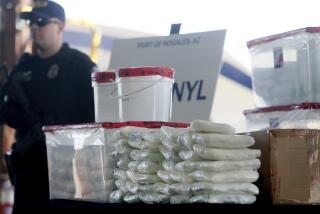TODAY’S TIP
- Share via
How to Discuss the Dangers of Drugs With Your Children
Experts suggest you talk to your children about alcohol and other drugs. As early as the fourth grade, kids worry about pressures to try drugs and alcohol. School programs alone aren’t enough, experts say. Open communication is one of the most effective tools you can use to help your child avoid drug use.
What do you say?
* Tell them that you love them and you want them to be healthy and happy. Say you do not find alcohol and other illegal drugs acceptable. Many parents never state this simple principle.
* Explain how substance abuse hurts people. Physical harm--for example, slowed growth, impaired coordination, accidents.
Emotional harm--sense of not belonging, isolation, paranoia.
Educational harm--difficulties remembering and paying attention.
* Discuss the legal issues. A conviction for a drug offense can lead to time in prison or cost someone a job, driver’s license or college loan.
* Talk about positive, drug-free alternatives and how you can explore them together. Ideas include sports, reading, movies, bike rides, hikes, camping, cooking, games and concerts. Involve your kids’ friends.
How do you say it?
* Calmly and openly--don’t exaggerate. The facts speak for themselves.
* Face to face--exchange information and try to understand each other’s point of view. Be an active listener and let your child talk about fears and concerns. Don’t interrupt and don’t preach.
* Through “teachable moments”--in contrast to a formal lecture, use a variety of situations--
television news, TV dramas, books, newspaper.
* Establish an ongoing conversation rather than giving a one-time speech.
* Remember that you set the example. Avoid contradictions between your words and your actions.
* Exchange ideas with other parents.
* Educate yourself about the facts surrounding alcohol and other drug use. You will lose credibility with your child if your information is not correct.
How can I tell if a child is using drugs?
* Change in moods--more irritable, secretive, withdrawn, overly sensitive, inappropriately angry, euphoric.
* Less responsible--late coming home, late for school or class, dishonest.
* Changing friends or changing lifestyles--new interests, unexplained cash.
* Physical deterioration--difficulty in concentration, loss of coordination, loss of weight, unhealthy appearance.
More information
National Clearinghouse for Alcohol and Drug Information: https://
www.health.org
P.O. Box 2345,
Rockville, MD 20847-2345
(800) 729-6686
Source: National Clearinghouse for Alcohol and Drug Information






